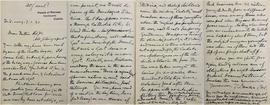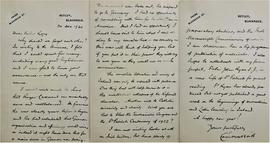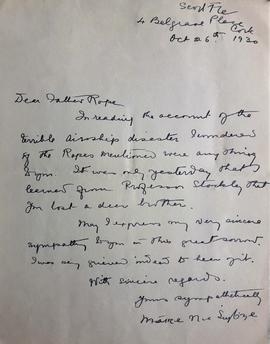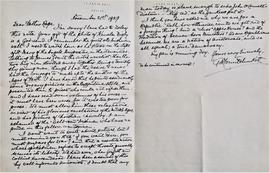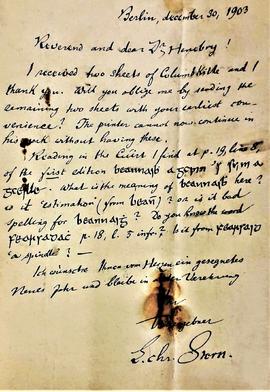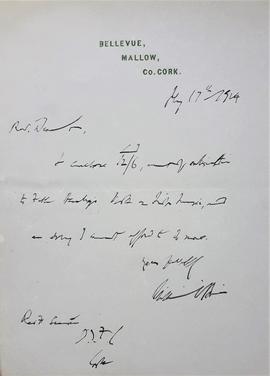A file including correspondence and related papers re the publication of Fr. Richard Henebry’s ‘A Handbook of Irish Music’. This work was eventually published posthumously by Henebry’s colleagues in University College Cork in 1928. The book was based on a surviving Henebry manuscript which Fr. Senan Moynihan OFM Cap. had acquired. Portions of the text were published by Fr. Senan in ‘The Father Mathew Record’. The 1928 publication was edited by Tadhg Ó Donnchadha (‘Torna’), Henebry’s successor as Professor of Irish in UCC.
The file includes correspondence between Sir Bertram Windle and Carl Gilbert Hardebeck on the value of Henebry’s manuscript (1914-16). Windle later affirmed that he did not publish the book at this time (1916) due to the financial cost of such an undertaking (see Windle’s letter to Senan Moynihan OFM Cap. on 4 July 1924). The correspondence from 1924 onward includes letters between Fr. Senan Moynihan OFM Cap., John English & Co., and several other printing and publishing companies, re the publication of Henebry’s manuscript. The file also includes letters from Seán Ó Currín, Eoin (John) Henebry, William Frederick Paul Stockley, Tomás de Faoite (Clonlisk, County Offaly), Edmund Downey, Fr. Laurence Dowling OFM Cap. (re the publication of extracts of the Henebry manuscript in the ‘The Father Mathew Record’), Fr. Michael Sheehan, Frank Ryan (the file includes several letters from Ryan written in Irish), Mac Giolla Bhríde (William Gibson, 2nd Baron Ashbourne), Fr. Maurus Phelan OCSO, William O’Brien (Bellevue, Mallow), Tadhg Ó Donnchadha (‘Torna’), Seán Ó Ciarghusa, Joseph B. Whelehan, Liam de Róiste, Fr. Richard Aylward (President, St. Kiernan’s College, Kilkenny), Patrick F. Rooney (71 West 95th Street, New York City), William Henry Grattan Flood, Maureen MacLysaght (Hazelwood, Mallow, County Cork), Fr. William Carrigan, (Durrow, County Laois), Douglas Hyde, Fr. Patrick MacSwiney, Fr. Patrick Power, Seán Ó Floinn, Patrick J. Merriman, and Fr. Canice Bourke OFM Cap. Includes letters to Tadhg Ó Donnchadha (‘Torna’) forwarding subscriptions for Henebry’s ‘A Handbook of Irish Music’ along with advertisement notices, lists of subscribers, order forms, and newspaper clippings.
A letter in this file from Eoin Henebry to Fr. Senan refers to a manuscript titled ‘The Fair Hosts of the Books of Erin’ written by Fr. Richard Henebry which his brother suggests has already been published. He mentions that all the ‘old stuff has been gone over by Seán Ó Currín, Seán Ó Floinn, and by Phil O’Neill’. (27 Aug. 1924).

